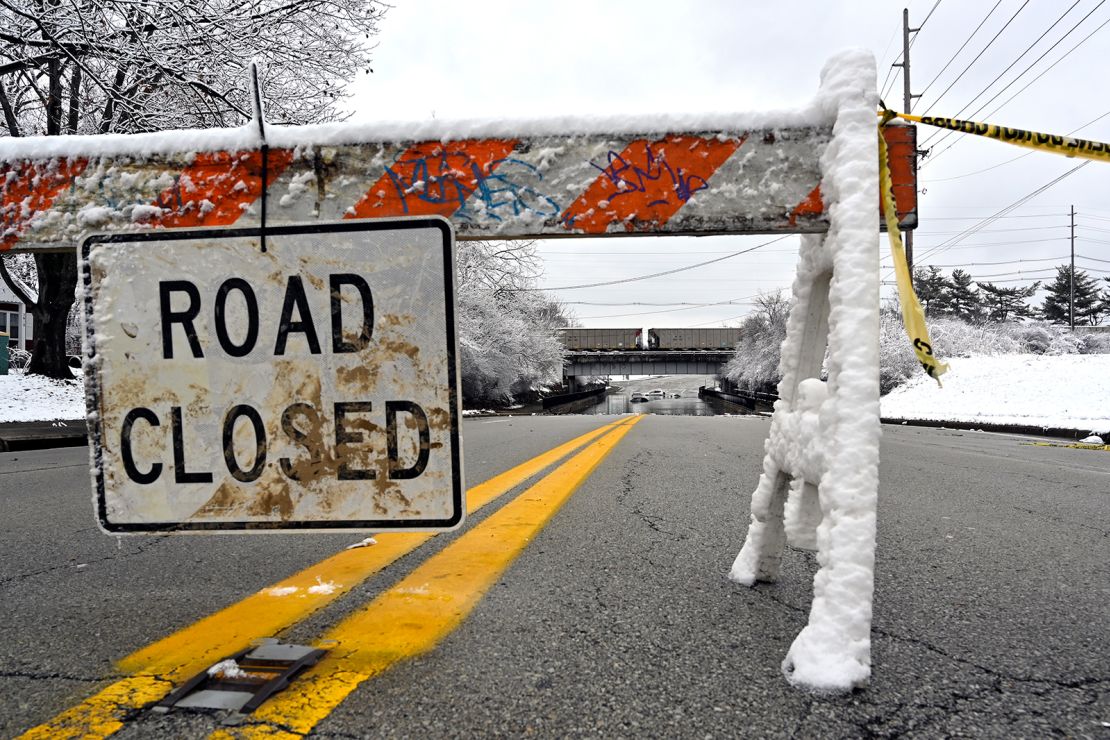This arctic air, interacting with a storm system moving out of the Rockies, will create hazardous winter weather across much of the Central US and Ohio Valley. At the same time, the bitter cold will complicate recovery efforts in parts of Kentucky, West Virginia, and the mid-Atlantic, where communities are still reeling from a deadly flooding caused by storms over the weekend.
At least 14 people have died in the aftermath of the flooding, including 12 in Kentucky, where extensive damage has left many communities struggling to recover.
By Friday, about three-quarters of the US population is expected to experience below-freezing conditions. The arctic air mass will plunge temperatures as much as 50 degrees below February averages, threatening to break more than 270 temperature records across at least 27 states.
Snow headed for Kentucky in wake of deadly flooding
The flooding in Kentucky is part of a weather pattern this month that continues to wreak havoc across the United States.
The storm moving east from the Rockies is forecast to reach the Ohio Valley and Appalachia on Wednesday. Snowfall accumulations of 3 to 5 inches are expected across Kentucky.
“We just got hit by one of the most significant natural disasters we’ve seen in our lifetime,” Gov. Andy Beshear said during a Monday news conference.
Though the rain has stopped, Beshear cautioned that the emergency is far from over, as rivers and streams remain dangerously swollen.
“There are individuals out there that still need help, that are still getting in contact with us,” Beshear said after visiting Pike County, one of the hardest-hit areas.
In neighboring Martin County, rising waters forced the evacuation of at least 237 residents by helicopter and boat from two apartment complexes, Beshear confirmed.
Since the flooding began, emergency crews from the Kentucky National Guard and Kentucky State Police have conducted more than 1,000 rescues, Beshear said.
In West Virginia, several people remained missing amid “significant levels of flooding,” Gov. Patrick Morrisey said.

Winter storm to bring snow and flood risks to Central US and Ohio Valley
Overall, more than 75 million people are under cold weather alerts spanning the Plains, Midwest, Great Lakes, and Northeast.
The storm expected to hit the Central US Tuesday and the Ohio Valley Wednesday is bringing heavy snow and ice across the region.
A winter storm warning is in place for Memphis from 1 p.m. Tuesday to 1 p.m. Wednesday, with 1 to 3 inches of snow and sleet, plus a light glaze of ice. Flood advisories remain for the Mississippi River.
Nashville is also under a winter storm warning and may see 3 to 4 inches of snow from 10 p.m. Tuesday to 1 p.m. Wednesday, with a flood advisory along the Cumberland River.
Louisville is under a winter weather advisory from 7 p.m. Tuesday to noon Wednesday, with 1–3 inches of snow expected as the Ohio River nearby stays at minor flood stage.
In the Midwest, 2 to 8 inches of snow is forecast for Kansas City and St. Louis, while Oklahoma City and Little Rock may face mixed precipitation and ice.
Further east, in Virginia, Richmond residents are urged to prepare for hazardous conditions as the region is under a winter storm watch, with snow and ice totals varying widely and flood warnings active for the James River.
Record-breaking cold, dangerous wind chills
As the arctic air pushes southward from Canada, record-breaking cold will spread to the Gulf Coast and Southeast. Dallas saw a high of 56 degrees Monday and could see its high temperatures drop below freezing by midweek. Houston will see one more day with a high above 60 degrees on Tuesday before seeing their high drop below 50 on Wednesday. Memphis, Nashville, and Atlanta are also bracing for frigid conditions, with Atlanta forecast to reach only the mid-30s by Thursday, about 20 degrees below average.
Wind chills will make the cold even more dangerous. In the Northern Plains, wind chills are expected to range from 30 to 60 degrees below zero, creating risks of frostbite within minutes of exposure.
Gusty winds will push wind chills below zero as far south as Texas and Arkansas by midweek, while single-digit wind chills are expected in parts of Tennessee and Kentucky towards the end of the week.
CNN’s Meteorologist Mary Gilbert and CNN’s Amanda Musa and Lauren Mascarenhas contributed to this report.














